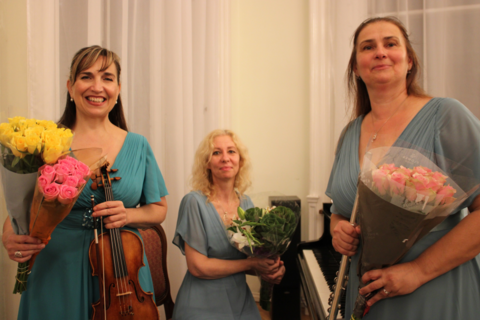
Triple triumph of London concerts by Trio Aquamarine
James Brewer reports on a series of recitals with a difference
The recently launched Trio Aquamarine (piano, violin, flute) has been greeted with acclaim at a series of thrilling concerts in London.
The warm verdict was delivered at three venues in the space of five days – at Wimbledon, in the form of a standing ovation; at the Bulgarian Embassy in Kensington, with sustained applause; and at Westminster Reference and Music Library in the heart of the West End, by a knowledgeable audience in awe of the display of bravura. The radiant, photogenic trio attired in their glorious aquamarine gowns, turned in world-class, shimmering performances each time of 60 magical minutes during a balmy late September 2023.
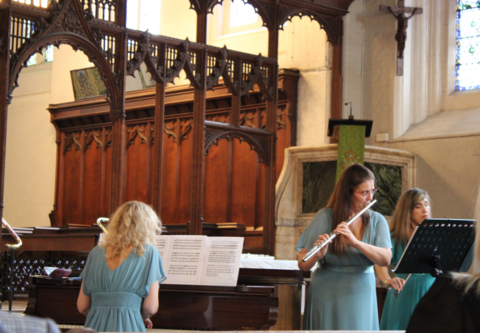
Trio Aquamarine is, unusually, based on two continents: Europe and North America. Musically speaking, the trio bridges the Atlantic Ocean and shows how, when people are connected through a passion for music, distance becomes just an illusion.
Members of the Trio were all born by the shores of the Black Sea and say that this has imbued them with a poetic and dreamy approach to life. They grew up in families with musical traditions — their relatives were recognised musicians, performers, and teachers.
Sally Wave (Savelina Kancheva) and Joy Tedford were born in Burgas, and Teodora (Teddy) Stoyanova is originally from Varna. Violinist Joy and flautist Teddy are established in the US while pianist and composer Sally is based in London. They all have distinguished careers as chamber musicians, solo performers, and teachers, with numerous concerts in Europe and the US.
Why the name Aquamarine? Among other attributes, the colour aquamarine represents happiness, hope and courage. In ancient times, aquamarine gems were thought to protect seafarers from the perils of the ocean and were sometimes associated with mermaids.

An excited audience gathered in the nave of St John the Baptist Church, Wimbledon, in the afternoon of Saturday the 23rd of September, when the guest of honour was the mayor of the London borough of Merton, Councillor Gill Manly, who has dedicated her year in office to causes including the encouragement of music education and performance. The musicians were later to praise the acoustic of the church, which is excellent thanks to the building’s Victorian High Gothic style with curved roof. Fine stained-glass windows include one which came from the famous William Morris works at Merton.
The programme opened with a lively duet for flute and violin, Here come the Troubadours op. 30 composed by Sally, and performed by Teddy and Joy. This piece is written in a new baroque style referencing medieval days when the troubadours were travelling musicians and all the people from a small village would gather to entertain themselves with such music . While music-making was tightly controlled by the churches and connected with sacral thoughts, troupes of musicians roamed the streets, singing of love and life. Here come the Troubadours exudes charm with its lively character and dance-like style.
This was followed by the Suite en trio op. 59 of Mel Bonis (1858-1937) a French Late-Romantic composer who wrote more than 300 pieces as she pursued a career in music despite family prejudice against women following the profession.
Then came another acknowledgement of French brilliance in the genre, from Jacques Ibert (1890-1962) his Deux interludes for flute, violin and piano. The first interlude was a slow minuet sounding a little wistful, and the second interlude a lively Andalusian dance.
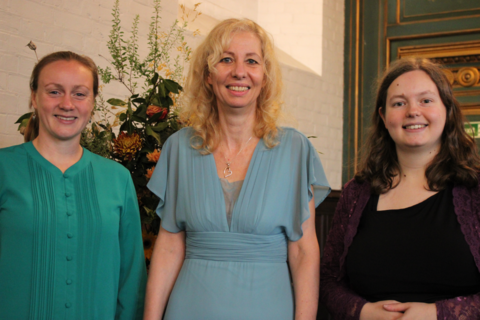
Next was what for many in the audience was the highlight of the afternoon: Sally’s composition Seeking, op. 35 for flute, violin and piano. Some listeners said later they felt close to tears as they listened to the 10-minute, single-movement work. Ahead of the Trio’s rendition, Sally explained that Seeking evokes someone who is in the grip of a dilemma, and searching for the path to the light, to the heart. The piece is built up as a single movement but has contrasting sections following the form of a sonata. Sudden changes represent the unnexpected in life and dramatic elements — the turbulence we go through often. The piece starts with four single notes presented in sequence by each instrument like a question and which are taken as a leitmotif later through the piece. Unusually in the recapitulation, the main theme appears in a new time signature. The finale brings back the adagio, as at the end of the piece one sees the light. Represented by a duet between the flute and the violin it elicits spiritual, unspoken feelings. The last few notes are left for the violin to pronounce — touching the strings of each heart, and provoking those tears in many eyes.
The performance was literally shot through with sunlight: as the Trio was nearing the end of the moving opus, as if on cue through the nearest window the sun poured forth its rays. The work was indeed permeated by unwavering emotional intensity. The score of Seeking is now available to borrow from Westminster Music Library, one of the most important such libraries in the UK, holding a voluminous range of sheet music and books about music for the public to consult and borrow: please see https://elibrary.westminster.gov.uk/client/en_GB/wcc/search/detailnonmodal/ent:$002f$002fSD_ILS$002f0$002fSD_ILS:1379255/one?qu=seeking+sally+wave
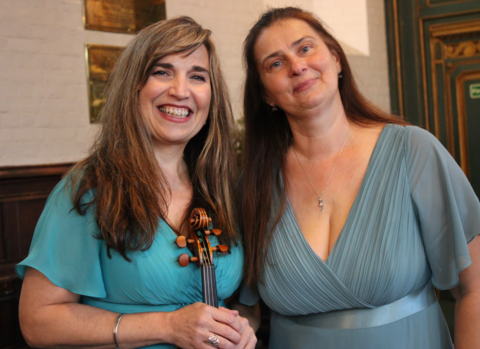
At the conclusion of the concert programme two very famous pieces with a Latin emphasis were presented, in a change of tempo and mood from Seeking. First was the Carlos Gardel classic Por Una Cabeza in an arrangement by Matthew Naughtin & Trio Aquamarine. The passionate tango number was written in 1935, the year when both Gardel and his lyricist Alfredo Le Pera tragically died in a plane crash in Colombia. Por Una Cabeza means “by a head” and refers to a horse narrowly being beaten in a race, with a gambler losing his money, and here to the man lamenting that he has lost the woman he loves.
Finally, the audiences were encouraged to tap out the beat “long-long-short” to accompany a version by Anon and Trio Aquamarine of Astor Piazzolla’s Libertango (a title mixing the Spanish word for liberty with the word tango). This exuberant work from 1973 has been arranged for many instruments and combinations and was here excellently adapted for piano, violin and flute. Libertango symbolised the freedom Piazzolla allowed his musicians as he created nuevo tango by incorporating elements of jazz and classical music.
Two days after the Wimbledon event, the Trio made their way to South Kensington for an evening performance under the splendour of the chandeliers in the elegant grand hall of the Embassy of Bulgaria. There, the Trio was congratulated by many compatriot music lovers and followers from cultural circles in London.
On Wednesday September 27 the venue was Westminster Reference Library which was transferred in recent times from its longstanding home near Victoria to 35 St Martin’s Street WC2 in the bustling West End. Members of the Trio expressed their gratitude to the Westminster team for their excellent organisation and unstinting support.
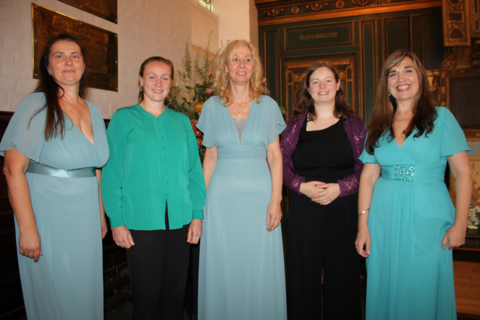
As Savelina Kancheva, Sally graduated from the Burgas Music School and later attended the Prof Pancho Vladigerov Bulgarian National Music Academy in Sofia, as did Joy, and enrolled in the masterclasses of the renowned Prof Rudolf Kehrer at the Franz Liszt Hochschule für Musik in Weimar. After success as a solo pianist and chamber musician in Sofia and as a piano teacher at the Bulgarian National School of Culture, Sally moved to the UK focusing on solo and chamber performance and composition. She is the founder and music director of the London Youth Piano Competition (www.lypco.co.uk) having previously established the Wimbledon international piano competitions in 2018 and 2019.
Sally’s compositions are listed at https://www.sallywave.com/my-music and several can be enjoyed on YouTube.
Joy Tedford began playing violin at the age of four as the youngest violin student in the Suzuki class at the Burgas Music School. From an early age she began competing in national and international violin competitions and music festivals, winning first prize at the prestigious competitions named after Svetoslav Obretenov in Bulgaria, and after Yan Kozian in the Czech Republic. At the latter event, Joy and Sally at the age of 13 collaborated for the first time.
Joy toured with orchestras throughout Western Europe and was a member of Plovdiv Symphony Orchestra and Plovdiv State Opera. Moving to the US, she continued her career with regional orchestras, including the Plano Symphony Orchestra and as first violinist with the Richardson Symphony Orchestra in Texas, and as a member of the Richardson String Quartet. She plays in the Tallahassee Symphony Orchestra, based in the state capital of neighbouring Florida, and performs with orchestras, church and chamber music groups in Georgia, Florida, and Alabama.
Joy’s current violin is a model known as a Cannon (an epithet bestowed by the virtuoso Niccolò Paganini because of its power and resonance) and was made specially for her by the renowned instrument maker Andrian Andreev, who studied in Cremona, the cradle of the craft he follows. Andreev’s studio is in the town of Kazanluk, Bulgaria, which has been the centre of violin making in Bulgaria since the early 20th century. Following classical techniques of the great Italian masters, he works with woods from the Balkans seasoned with resins, oils, and pigments to achieve the best acoustic properties.
Performing and teaching in Atlanta, Georgia, Teddy has a repertoire extending through chamber music to ballet, jazz, and flamenco. Born in Varna, the largest city and resort on the Bulgarian Black Sea coast, she graduated from the music school there and met Sally and Joy when she moved to Sofia to study at the National Academy of Music. Her father worked as a clarinet teacher for 50 years at the Dobri Hristov National Music School in Varna. Teddy is a winner of many awards in national and international competitions, among which have been the Music and the Earth special award and 1st place at the Svetoslav Obretenov competition.
In Bulgaria, she worked as a first flautist in the State Philharmonic- Vidin and the Academic Symphony Orchestra at the Prof Pancho Vladigerov national academy. Before moving to the US, she worked as a teacher at the Lyubomir Pipkov National Music School in Sofia and as a prime assistant in the class of Prof Lidiya Oshavkova at the National Music Academy.
She has toured Europe as a soloist and chamber musician, and after moving to the US performed with the Atlanta Flute Ensemble, Aulos Winds, and the DaSalo Solisti Chamber Orchestra. She is principal flautist of the Gwinnett Symphony Orchestra. Even while living on the other side of the ocean, Teddy continues to perform in Bulgaria where recently she has been a soloist of the Shumen Symphony Orchestra. Her latest projects in Atlanta included performing as a soloist in the splendid flamenco show of dancer Ania La Candela that featured esteemed jazz pianist Dr Jose Manuel Garcia.
Said Teddy: “Before I discussed this concert series with Sally and Joy, it never crossed my mind that I would go to play in London. I love making music in different places, so this opportunity was a thrilling experience for me.”

The three members of the Tailleferre Ensemble who performed at Wimbledon were Nicola Hands, Amy Thompson, and Nicola Crowe, presenting a world premiere of Scattered Autumn Leaves are Dancing Around op. 16 for flute, cor anglais and bassoon, composed by Sally Wave. The work is dedicated to oboist Nicola Hands and bassoonist Amy Thompson, and the premiere was performed, appropriately, on the 2023 Equinox marking the beginning of autumn in the northern hemisphere, when leaves are already tumbling from the trees.
The Tailleferre Ensemble (https://www.tailleferre-ensemble.com) is a women’s chamber collective, founded in 2019. Its aim is to promote women in music and offers recitals of varied instrumentation and genre, including established, lesser-known, and contemporary works. It is named after Germaine Tailleferre (1892-1983), a French composer who was the only female member of the group of composers known as Les Six.
The group perform regularly around the UK, and their debut album There Are Things to be Said was released in February 2023. Reviewers have praised the group’s “superb musicianship” and “effortless” performance on the recording.
In an interview, Nicola Hands told us: “I am pleased that we have managed to bring lesser-known composers to several larger venues in London, including St John’s Smith Square, Conway Hall, and St James Piccadilly. We have also become regular partners with the Nottingham Chamber Music Festival which, as a younger enterprise, is enthusiastic about finding new and creative ways to invite audiences in.
“We are very pleased that the public is becoming more aware of women composers who have been neglected throughout history, as our primary focus is to promote women in music. We provide a balance in our concert programmes of music composed by women and men. By providing this balance we hope to normalise the regular appearance of women’s names in concert programmes, rather than as a special or token feature. We have even performed occasional programmes of all-women composers, say to celebrate International Women’s Day, but our aim is to present women composers on the same footing as their male counterparts. In so doing we hope to influence other groups to investigate and research what music there is available to them to perform that has been neglected.”
Of Sally’s composition Scattered Autumn Leaves are Dancing Around Nicola said: “We are always enthusiastic about exploring works with unusual instrumentation, so we particularly enjoyed the use of cor anglais rather than oboe in this trio. The evocative nature of the piece also appealed to us, with the irregular rhythmic patterns so well depicting the fluttering of falling leaves. And of course, it is always lovely when the bassoon gets a chance to play the melody rather than just a bass line as can happen so often!”
Trio Aquamarine is looking forward to entertaining audiences next season in London, elsewhere in Europe, and in North America, and is excited about the forthcoming launch of a new CD. The Trio’s Instagram link is https://instagram.com/aquamarinetrio?igshid=NGVhN2U2NjQ0Yg==





